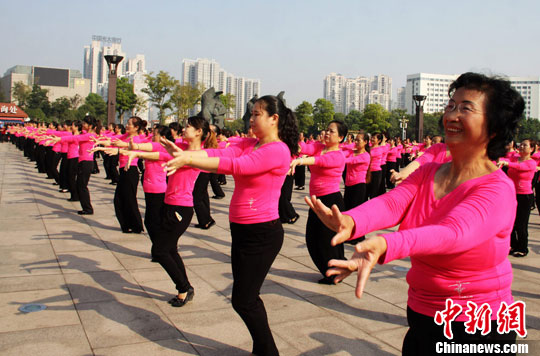 |
| Guangchangwu dancers (File photo/CNS) |
Dusk had fallen over Changping district, in the northern suburbs of Beijing on August 30, and the public square was no longer being used as a basketball court. The teenage players had been replaced by dozens of female dancers, and the sounds of music and dancing had begun to fill the square.
But at around 8 pm, the event was brutally cut short when an intoxicated man emerged from his nearby property. Enraged by the music, he lifted his gun and began firing into the air.
"I just wanted some good sleep and I shot because I was so angry about the annoying noise," the man, surnamed Shi, later said on China Central Television (CCTV).
That was the last time the dancers gathered in the square. Shi appeared before a court in Changping on November 5, charged with illegal possession of a firearm.
This kind of dancing in public squares, known in China as guangchangwu, involves choreographed dance, incorporating a variety of styles. In the morning and evening, in parks, squares and residential compounds across the country, groups of people, mostly middle-aged and elderly women, can be seen participating, in an effort to exercise and socialize with peers.
But this kind of dancing is not without its downsides. Rather than pillorying Shi as a villain, Net users have been unusually sympathetic, and the widespread support online shows that not everyone is a fan of guangchangwu, and in many cases, nearby residents are losing their tempers.
Raging residents
Due to its low cost and ease of participation, guangchangwu is a popular pastime. According to a report broadcast by CCTV on Thursday, China has over 100 million fans of the dance, most of whom are women aged between 40 and 65.
"It's an activity that can help people socialize and increase confidence. Maybe you don't have much dancing skill or the confidence to dance in front of the public, but you can still enjoy guangchangwu," said 50-year-old Beijinger Wang Xin.
But its detractors are legion. According to a survey by the Beijing News on Saturday, over half of the respondents said the activity is "annoying" because of the noise.
"I think guangchangwu is a good activity but the music they play is always too loud to tolerate," said Wang.
A staff member from a residential committee office in Beijing's Chaoyang district told the Global Times on condition of anonymity that it is not rare for him to get over 10 complaints from residents during summer.
"Some complain about people dancing in residential areas, and some complain about salesgirls who danced in front of their shops every morning," he said.
While Shi's case was a striking example of how rage from nearby residents can manifest, it is far from unique, and it is not localized to China.

 Luxury-cars parade held in Dubai
Luxury-cars parade held in Dubai Special forces take tough training sessions
Special forces take tough training sessions Fire guts 22-storey Nigeria commercial building in Lagos
Fire guts 22-storey Nigeria commercial building in Lagos A girl takes care of paralyzed father for 10 years
A girl takes care of paralyzed father for 10 years A record of Beijing air quality change
A record of Beijing air quality change In pictures: explosions occur in Taiyuan
In pictures: explosions occur in Taiyuan Live a harmonious life in Pu'er, SW China
Live a harmonious life in Pu'er, SW China Weekly Sports Photos
Weekly Sports Photos Gingko leaves turn brilliant golden yellow in Beijing
Gingko leaves turn brilliant golden yellow in Beijing Maritime counter-terrorism drill
Maritime counter-terrorism drill Loyal dog waits for master for six months
Loyal dog waits for master for six months The catwalk to the world of fashion
The catwalk to the world of fashion  China in autumn: Kingdom of red and golden
China in autumn: Kingdom of red and golden National Geographic Traveler Photo Contest
National Geographic Traveler Photo Contest Living in an urban village: 'Iron-digger' Xiong Sansan
Living in an urban village: 'Iron-digger' Xiong SansanDay|Week|Month